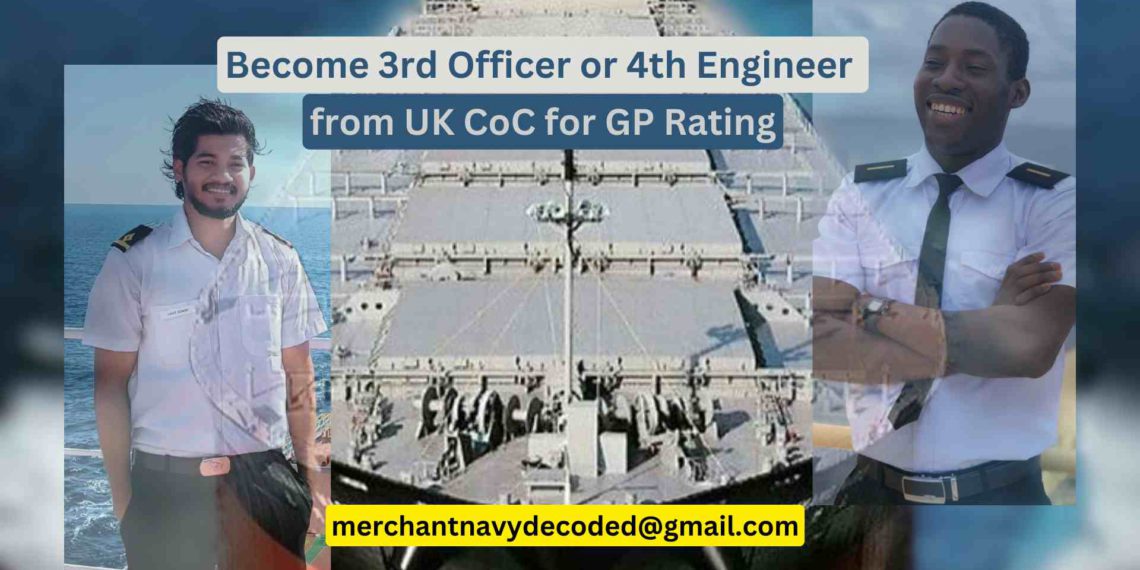How to Become 3rd Officer or 4th Engineer with UK CoC
Table of contents
1:- Overview
On ships, 3rd and 4th Engineers have big jobs. They make sure the ship’s engine and machinery work well. As you move up from a GP Rating, your job gets more important. 3rd Engineers manage the engine room and lead junior staff, while 4th Engineers help with maintenance. The good part? More responsibility means more money.
To reach these roles, getting a UK CoC is like a special key for the GP Rating crew in the merchant navy. It teaches you the skills needed for engine room jobs. With the UK CoC, you can be promoted to a higher rank, handle responsibility, and earn more. So, it’s like a guide helping you have a successful and well-paying career at sea.
2:-Why UK CoC for GP Rating?
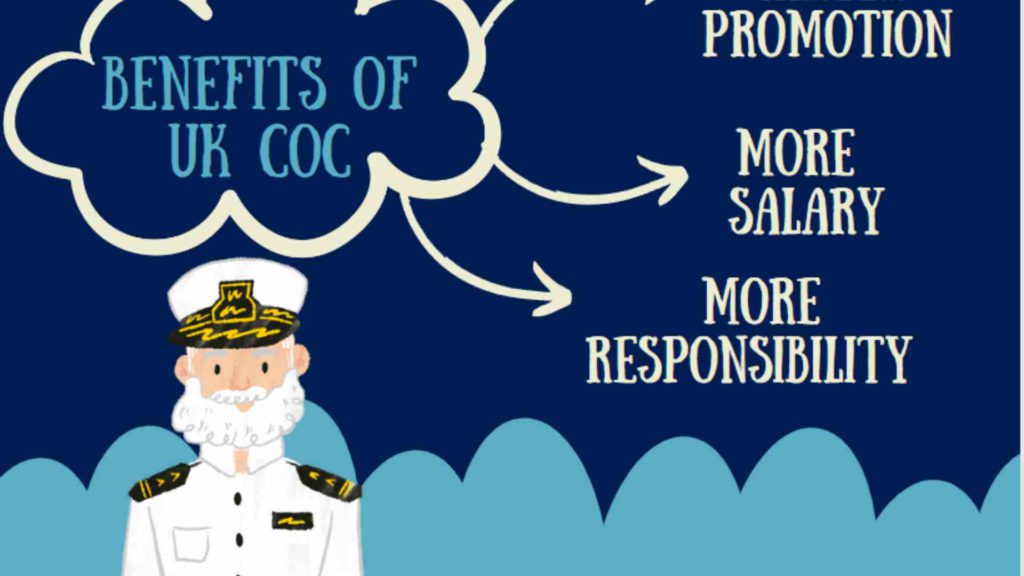
Acquiring a UK CoC is a game-changer for GP-rating personnel aspiring to climb the ranks in the merchant navy. Here’s why:
2.1:- Career Promotion
The UK CoC opens doors to higher-ranking positions, allowing GP-Rating personnel to step into roles like 3rd or 4th Engineer. This advancement not only enhances their skills and responsibilities but also marks a significant progression in their maritime career.
2.2:- Increased Salary
With a UK CoC, engineers enjoy a substantial increase in earning potential. The specialized knowledge and skills gained through the certification make them valuable assets to shipping companies, resulting in higher salaries and better compensation packages.
2.3:- Path to Chief Engineer Position
The CoC is a stepping stone towards the prestigious role of Chief Engineer. Through continuous learning, practical experience, and dedication, engineers can climb the ranks and eventually take on leadership roles, overseeing the entire engineering department of a ship.
Eager to Know about the UK CoC then our UK CoC guidance series will be the best bet you can make.
3:- GP Rating Colleges to Become a 4th Engineer or 3rd Officer with UK CoC
This list features colleges offering programs for UK CoC in the United Kingdom.
| Colleges of UK CoC from the United Kingdom | |
| 1. | South Shields Marine School |
| 2. | City of Glasgow College |
| 3. | Warsash Maritime School |
| 4. | Fleetwood Nautical College |
4:- Why not Indian CoC?
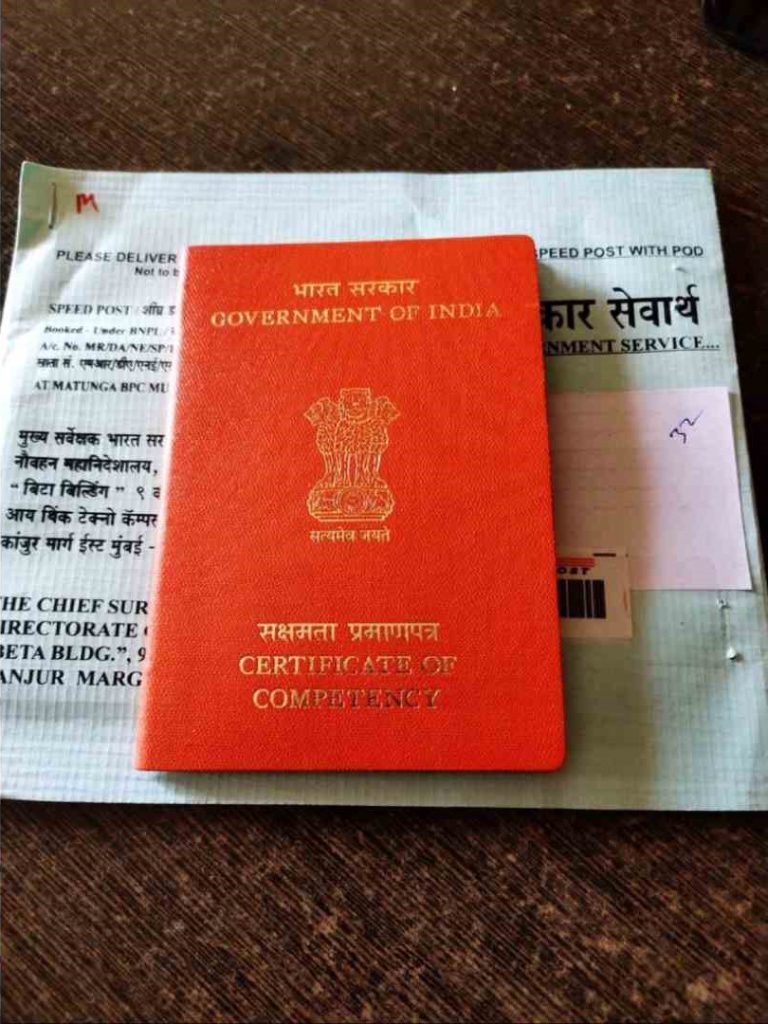
4.1:- Rigorous Exam Structure
The examination structure for an Indian CoC is known for its complex examination structure. The numerous exams, coupled with the depth of knowledge required, can make the process daunting for candidates.
4.2:- Strict Eligibility Criteria
The eligibility criteria for pursuing an Indian CoC can be stringent, potentially limiting the number of candidates who can apply.
4.3:- Outdated Educational Approach
The curriculum and teaching methods may not align with modern advancements in maritime studies and industry practices, potentially leaving candidates with a knowledge gap in contemporary maritime technologies and methodologies.
5:- How to become a 3rd Officer or 4th Engineer with UK CoC?

Deciding how to become a 3rd or 4th Engineer in the UK is a big choice. Think about what works best for you – your situation, what you like, and your plans. Look at the good and bad sides of each option. This way, you can pick the way of learning that suits you and helps you succeed in the merchant navy.
5.1:- Completing a Course in the UK
- The UK is known for high standards in maritime education and training. Obtaining a CoC from the UK ensures that you meet or exceed global industry standards, demonstrating your competence and professionalism to potential employers.
- Achieving the UK CoC for GP Rating is the foundational step that serves as a key qualification in the maritime industry because companies recognize and value the UK CoC
- The CoC validates their competence and proficiency in handling the technical aspects of marine engineering. With the UK CoC in hand, individuals can then seek employment opportunities as 3rd Officers or 4th Engineers on ships.
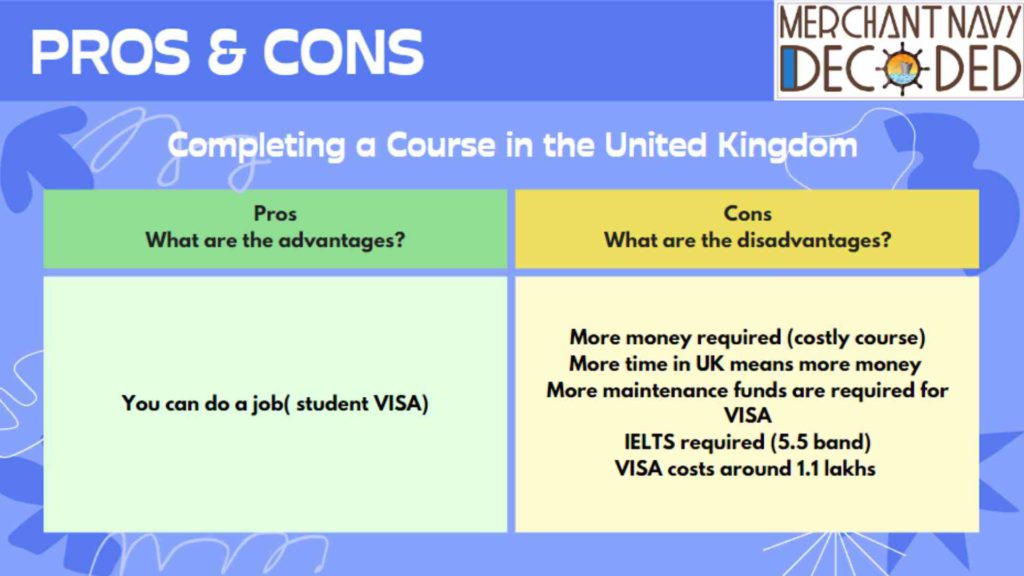
Money required to complete a course in the UK
| Expense Item | Estimated Cost (in INR) |
| Course Fees | 6,00,000 to 10,00,000 |
| Maintenance Funds (Visa) | Variable |
| IELTS Coaching Fees | Variable |
| Visa Cost | 1,10,000 |
| Total Estimated Expenditure | 10,00,000-15,00,000 |
5.2:- Blended learning Uk and India
- Blended learning for becoming an engineer or deck officer means you get training in both India and the UK.
- If you want to be an engineer, you start with three months of training in India to learn the basics. Then, you go to the UK for another three months to get more specialized skills.
- For deck officers, it’s a bit longer. You start with three months of training in India to understand navigation and ship stuff. Afterward, you go to the UK for six months to learn more advanced navigation, safety, and leadership skills.
- The cool thing is that this way of learning combines the good parts of training in India with the advanced stuff in the UK. Plus, it’s not super expensive because the time spent in the UK is made to be cost-effective.
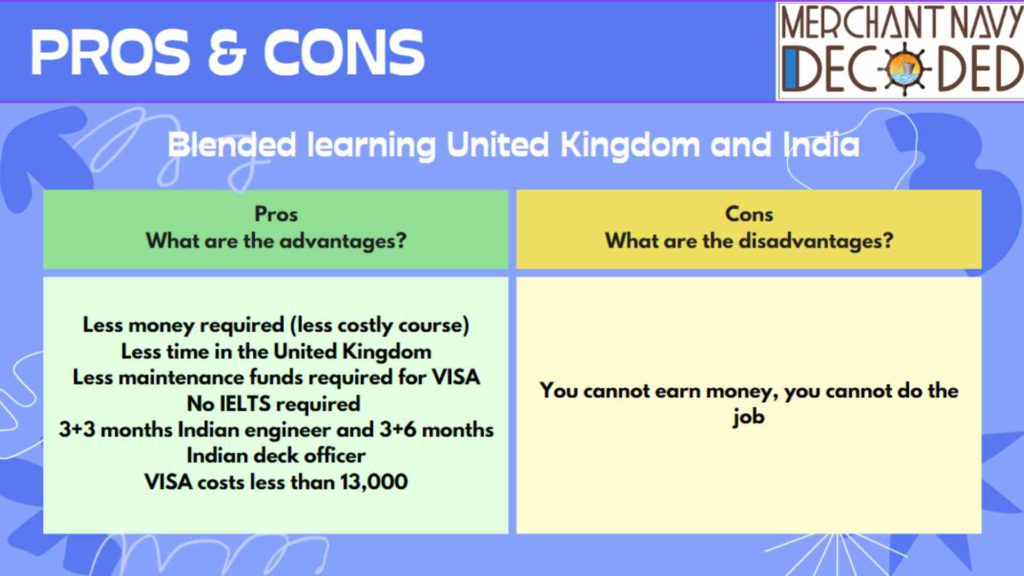
Money required to complete a course in the UK
| Expense Item | Estimated Cost (in INR) |
| Course Fees | 5,00,000-6,00,000 |
| Visa Cost | 13,000 |
| Total Estimated Expenditure | 6,00,000-7,00,000 |
6:- What if you fail in the UK CoC?
If you don’t pass a test in the UK to become a 3rd or 4th engineer, you’ll have to stay there for an extra month. Failing each test can also cost you an extra £100-£270. Retaking tests is important, but it takes more time and money. It might feel tough, but you’re learning and improving every time you try again. So, even though it’s a bit hard, each retake is like investing in yourself and your future as an engineer in the UK. Keep going, and you’ll get there!
7:- Tips for Success in the UK CoC Exam
Practice tests are the key to excellence:- Use books and practice tests to help you understand and prepare.
Focus on the goal and give it the best shot:- Passing early saves you money because you won’t have to pay extra for retakes.
Practical Learning:- Think about what you learned on the job—it can help in the exam.
Positive mindset:- Passing early can help you move up faster, which might mean more money in the long run.
8:- Conclusion
In conclusion, the journey to becoming a 3rd or 4th Engineer in the UK offers distinct paths, each with advantages and challenges. While choosing between completing a course in the UK or opting for a collaborative program with Indian colleges, the decision ultimately rests on individual circumstances, preferences, and aspirations.
The key to success lies in aligning your educational journey with personal goals. Choose wisely, invest in your future, and set sail towards a rewarding career in the merchant navy.
Disclaimer :- The opinions expressed in this article belong solely to the author and may not necessarily reflect those of Merchant Navy Decoded. We cannot guarantee the accuracy of the information provided and disclaim any responsibility for it. Data and visuals used are sourced from publicly available information and may not be authenticated by any regulatory body. Reviews and comments appearing on our blogs represent the opinions of individuals and do not necessarily reflect the views of Merchant Navy Decoded. We are not responsible for any loss or damage resulting from reliance on these reviews or comments.
Reproduction, copying, sharing, or use of the article or images in any form is strictly prohibited without prior permission from both the author and Merchant Navy Decoded.

